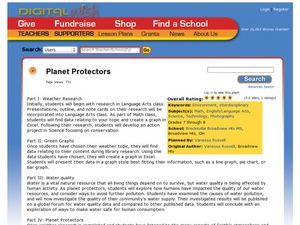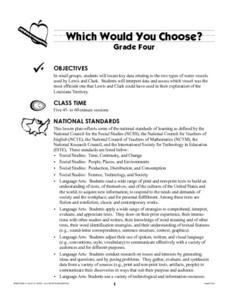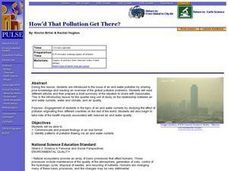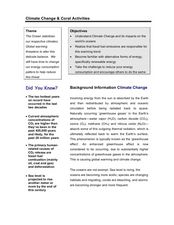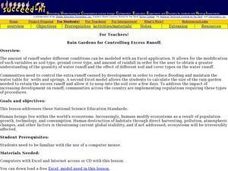Curated OER
Wat-er We Good For?
Fifth graders practice taking a water audit of their home and school. They create a chart the amount of water consumption to become water-use aware.
Curated OER
Let us Help
Students explore water conservation. In this ecology and civic responsibility instructional activity, students identify agencies that monitor and help improve water quality and describe what they do. Students research these organizations...
Curated OER
Planet Protectors
Students explore ways to protect the earth. In this environmental issues and technology lesson plan, students investigate the water quality in their community and compare their findings to the water quality in other geographic areas. ...
Curated OER
Which Would You Choose?
Fourth graders investigate two types of water vessels that were used by Lewis and Clark during the exploration of the Louisiana Territory. They interpret data to determine which vessel was more efficient.
Curated OER
How Much Are We Using?
Third graders investigate environmental stability through consumption and recycling. They look into how much of a recyclable good it takes to create one new product. Pupils compile a list of these quantities, then create posters that are...
Curated OER
Household Conservation/Efficiency
Hook your class up to an online home energy usage calculator so that they can estimate the amount used per month by their families. Then give them Watt meters with which they will measure the power consumption of several small...
Curated OER
Dilution and Concentration of Solutions
Future chemists practice laboratory techniques by creating a monochloramine solution. The objectives are to use of dilution, 9concentration, and measurement skills and to prepare a solution that will be used in a water treatment...
Consumers Energy
The Cost of Electricity
How much is your toaster costing you every day? Young environmentalists calculate the monetary costs of household appliances based on their average consumption of wattage.
Virginia Department of Education
Heat Transfer and Heat Capacity
It's time to increase the heat! Young chemists demonstrate heat transfer and heat capacity in an activity-packed lab, showing the transitions between solid, liquid, and gaseous phases of materials. Individuals plot data as the changes...
Curated OER
Not a Drop to Drink
Students explore potential issues of a water shortage. In this water conservation instructional activity, students brainstorm the many uses of water and what life would be like if there was not enough water available.
Curated OER
Florida's Springs
Learners follow the journey that water takes in aquifers and springs. They write about the major threats to the aquifer and the solutions to these threats.
Curated OER
Environment: How'd That Pollution Get There?
Students examine how global wind and water patterns aid in the spread of worldwide pollution. In groups, they read articles about the domino effect of pollution and create posters displaying its journey. On blank world maps, students...
Curated OER
Editorial Writing
Use your class's knowledge of pollution and water treatment to write an editorial to town citizens. They apply prior knowledge in order to compose a letter intended for newspaper publication, focusing on writing to an appropriate audience.
NOAA
Seafood and Human Health
Whether your young biologists realize it or not, humans play a significant role in marine ecosystems. To help them understand this fact children first create graphical representations that show homo sapiens' place in marine food chains,...
Beyond Benign
Ecological Footprint
How does your lifestyle measure up in terms of your ecological footprint? Young ecologists examine their impact on the planet using an insightful online calculator. A short quiz asks users to rank the size of their homes, their energy...
Curated OER
Energy Conservation
Students discuss the different uses of energy. They examine the consumption percentages to do household tasks. They discover ways to reduce their energy consumption.
Curated OER
Climate Change & Coral Activities
Learners study how the ocean stabilizes our planet's climates and how global warming is becoming a threat to this fine balance. In this climate change lesson, students identify that fossil fuel emissions are responsible for global...
Michigan Sea Grant
Wetlands
Wetlands may not sound particularly ornate, but they are as important as any habitat! With a hands-on activity, young scientists build a wetland model and observe its many functions in action. They discover the importance of wetlands to...
Curated OER
Rethink Your Drink
Learners identify the contents of popular drinks. In this health lesson students learn how to read labels and devise ways that they can drink more water.
Curated OER
Bike-Sharing Catches On
Students discuss how people are reducing their fuel consumption, then read a news article about a new bike-sharing program in Washington, D.C. In this current events and alternative transportation lesson plan, the teacher introduces the...
Curated OER
Rain Gardens for Controlling Excess Runoff
Learners address the idea that human beings live within the world' ecosystems. They discuss how humans modify ecosystems as a result of population growth, technology, and consumption. Students discuss how the human destruction of...
Curated OER
Message in the Bottles
Students identify the three realms of the Arctic Ocean, and describe the relationships among these realms. They explain the relationships between gross primary productivity, net primary productivity, and respiration.
Curated OER
Have and Have-Not
Learners describe the differences of people living in developed and underdeveloped countries. They also identify how each type of country uses their resources. They develop an ecological footprint of the countries discussed.
Curated OER
Mississippi’s Electricity: From Generation to Consumption
Eighth graders discover how electricity is produced. In this physics lesson, 8th graders infer about the future of Mississippi's energy industry. They participate in a Smart Board interactive activity at the end of the lesson.
Other popular searches
- Human Water Consumption
- Personal Water Consumption
- Graphing Water Consumption
- Food and Water Consumption
- Water Consumption Need




